1664 – Louis XIV of France begins construction of the Palace of Versailles.
The Palace of Versailles (French: Château de Versailles ) was the principal royal residence of France from 1682, under Louis XIV, until the start of the French Revolution in 1789, under Louis XVI. It is located in the department of Yvelines, in the region of Île-de-France, about 20 kilometres (12 miles) southwest of the centre of Paris.
A simple hunting lodging and later a small château with a moat occupied the site until 1661, when the first work expanding the château into a palace was carried out for Louis XIV. In 1682, when the palace had become large enough, the king moved the entire royal court and the French government to Versailles. Some of the palace furniture at this time was constructed of solid silver, but in 1689 much of it was melted down to pay for the cost of war. Subsequent rulers mostly carried out interior remodeling, to meet the demands of changing taste, although Louis XV did install an opera house at the north end of the north wing for the wedding of the Dauphin and Marie Antoinette in 1770. The palace has also been a site of historical importance. The Peace of Paris (1783) was signed at Versailles, the Proclamation of the German Empire occurred in the vaunted Hall of Mirrors, and World War I was ended in the palace with the Treaty of Versailles, among many other events.
The palace is now a historical monument and UNESCO World Heritage site, notable especially for the ceremonial Hall of Mirrors, the jewel-like Royal Opera, and the royal apartments; for the more intimate royal residences, the Grand Trianon and Petit Trianon located within the park; the small rustic Hameau (Hamlet) created for Marie Antoinette; and the vast Gardens of Versailles with fountains, canals, and geometric flower beds and groves, laid out by André le Nôtre. The Palace was stripped of all its furnishings after the French Revolution, but many pieces have been returned and many of the palace rooms have been restored.
In 2017 the Palace of Versailles received 7,700,000 visitors, making it the second-most visited monument in the Île-de-France region, just behind the Louvre and ahead of the Eiffel Tower.
French stamps depicting the Palace of Versailles
1825 Died: Antonio Salieri, Italian composer and conductor (b. 1750)
Antonio Salieri (18 August 1750 – 7 May 1825) was an Italian classical composer, conductor, and teacher. He was born in Legnago, south of Verona, in the Republic of Venice, and spent his adult life and career as a subject of the Habsburg Monarchy.
Salieri was a pivotal figure in the development of late 18th-century opera. As a student of Florian Leopold Gassmann, and a protégé of Christoph Willibald Gluck, Salieri was a cosmopolitan composer who wrote operas in three languages. Salieri helped to develop and shape many of the features of operatic compositional vocabulary, and his music was a powerful influence on contemporary composers.
Appointed the director of the Italian opera by the Habsburg court, a post he held from 1774 until 1792, Salieri dominated Italian-language opera in Vienna. During his career he also spent time writing works for opera houses in Paris, Rome, and Venice, and his dramatic works were widely performed throughout Europe during his lifetime. As the Austrian imperial Kapellmeister from 1788 to 1824, he was responsible for music at the court chapel and attached school. Even as his works dropped from performance, and he wrote no new operas after 1804, he still remained one of the most important and sought-after teachers of his generation, and his influence was felt in every aspect of Vienna's musical life. Franz Liszt, Franz Schubert, Ludwig van Beethoven, Johann Nepomuk Hummel and Franz Xaver Wolfgang Mozart were among the most famous of his pupils.
Salieri's music slowly disappeared from the repertoire between 1800 and 1868 and was rarely heard after that period until the revival of his fame in the late 20th century. This revival was due to the dramatic and highly fictionalized depiction of Salieri in Peter Shaffer's play Amadeus (1979) and its 1984 film version. The death of Wolfgang Amadeus Mozart in 1791 at the age of 35 was followed by rumors that he and Salieri had been bitter rivals, and that Salieri had poisoned the younger composer, yet it is likely that they were, at least, mutually respectful peers.
Italian stamp depicting Salieri
1892 Born: Josip Broz Tito, Yugoslav field marshal and politician, 1st President of Yugoslavia (d. 1980)
Josip Broz (7 May 1892 – 4 May 1980), commonly known as Tito, was a Yugoslav communist revolutionary and statesman, serving in various roles from 1943 until his death in 1980. During World War II, he was the leader of the Partisans, often regarded as the most effective resistance movement in occupied Europe. While his presidency has been criticized as authoritarian and concerns about the repression of political opponents have been raised, Tito has traditionally been seen as a benevolent dictator.
He was a popular public figure both in Yugoslavia and abroad. Viewed as a unifying symbol, his internal policies maintained the peaceful coexistence of the nations of the Yugoslav federation. He gained further international attention as the chief leader of the Non-Aligned Movement, alongside Jawaharlal Nehru of India, Gamal Abdel Nasser of Egypt, and Kwame Nkrumah of Ghana.
Broz was born to a Croat father and Slovene mother in the village of Kumrovec, Austria-Hungary (now in Croatia). Drafted into military service, he distinguished himself, becoming the youngest sergeant major in the Austro-Hungarian Army of that time. After being seriously wounded and captured by the Imperial Russians during World War I, he was sent to a work camp in the Ural Mountains. He participated in some events of the Russian Revolution in 1917 and subsequent Civil War.
Upon his return to the Balkans in 1918, Broz entered the newly established Kingdom of Yugoslavia, where he joined the Communist Party of Yugoslavia (KPJ). He later was elected as General Secretary (later Chairman of the Presidium) of the League of Communists of Yugoslavia (1939–1980). During World War II, after the Nazi invasion of the area, he led the Yugoslav guerrilla movement, the Partisans (1941–1945).
After the war, he was selected as Prime Minister (1944–1963), and President (later President for Life) (1953–1980) of the Socialist Federal Republic of Yugoslavia (SFRY). From 1943 to his death in 1980, Tito held the rank of Marshal of Yugoslavia, serving as the supreme commander of the Yugoslav military, the Yugoslav People's Army (JNA). With a highly favourable reputation abroad in both Cold War blocs, he received some 98 foreign decorations, including the Legion of Honour and the Order of the Bath.
Tito was the chief architect of the second Yugoslavia, a socialist federation that lasted from November 1943 until April 1992. Despite being one of the founders of Cominform, he became the first Cominform member to defy Soviet hegemony in 1948. He was the only leader in Joseph Stalin's time to leave Cominform and begin with his country's own socialist program, which contained elements of market socialism. Economists active in the former Yugoslavia, including Czech-born Jaroslav Vanek and Yugoslav-born Branko Horvat, promoted a model of market socialism that was dubbed the Illyrian model. Firms were socially owned by their employees and structured on workers' self-management; they competed in open and free markets.
Tito built a very powerful cult of personality around himself, which was maintained by the League of Communists of Yugoslavia after his death.
Tito managed to keep ethnic tensions under control by delegating as much power as possible to each republic. The 1974 Yugoslav Constitution defined SFR Yugoslavia as a "federal republic of equal nations and nationalities, freely united on the principle of brotherhood and unity in achieving specific and common interest." Each republic was also given the right to self-determination and secession if done through legal channels. Lastly, Kosovo and Vojvodina, the two constituent provinces of Serbia, received substantially increased autonomy, including de facto veto power in the Serbian parliament.
Ten years after his death, Communism collapsed in Eastern Europe, and Yugoslavia descended into civil war.
Stamps from Yugoslavia depicting Tito



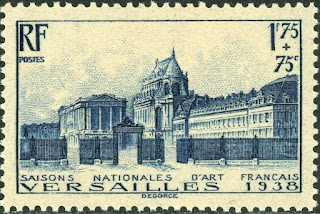
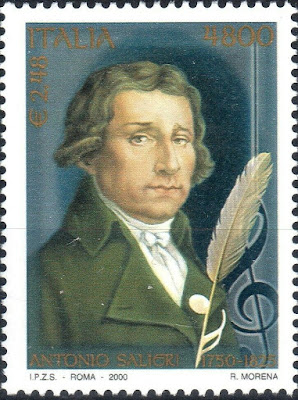
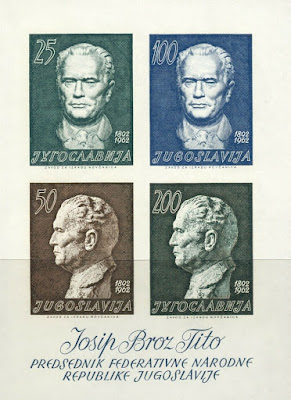

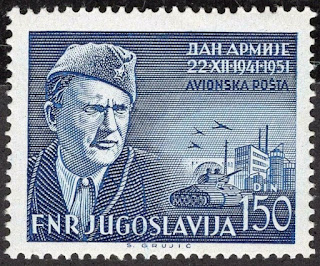
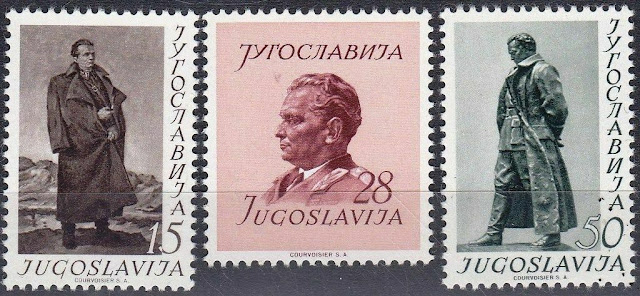
No comments:
Post a Comment